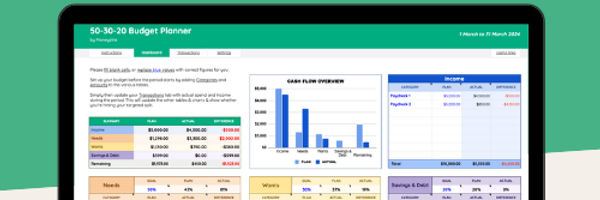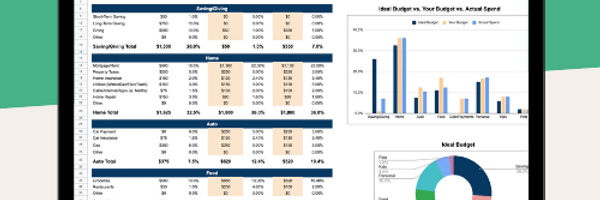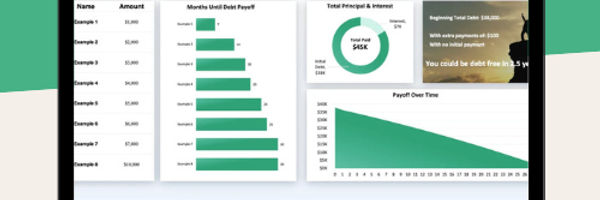Will we see an economic downturn anytime soon? Or are we running out of time for a 2023 recession?
A quick look at expert opinions and you’ll see there’s no consensus—thanks to conflicting economic signals.
Inflation is finally dropping, but the Federal Reserve still plans to raise the interest rate to achieve its 2% inflation target.
Major tech companies are announcing layoffs every day, but employers added an impressive 339,000 jobs in May 2023 (more jobs than the US economy added in any single month in 2019).
The odds for a 2023 recession might be 50/50, but you want to be prepared to survive—or even thrive—if it hits.
This article will show you:
Top tips to prepare for a recession in 2023.
How to survive the slowdown that’s already here.
The best ways to take advantage of a slump in the economy.
Read more:
How to Prepare for a Recession: 9 Best Tips for 2026
Here’s a step-by-step breakdown of what we think is the best way to prepare for a slowdown—
1. Diversify your investment portfolio
You know what they say: Don’t put all your eggs in one basket. Cliché, but it’s true—especially with investing.
It’s essential to have a well-diversified investment portfolio. That means your investments shouldn’t be tied to a single stock or real estate property.
Make sure to spread your investments across multiple industries and businesses. This way, your entire portfolio remains unaffected even if one industry or business goes into turmoil.
Diversify your efforts by investing in mutual funds, index funds, real estate, and small businesses.
How to invest
We went through dozens of investment platforms and meticulously graded each of them based on eight categories: account minimum, trading costs, account fees, selection, ease of use, sign-on bonus, education, and customer service.
And here come our top picks—the 13 best investment apps:
Looking for more options? Read our detailed ranking of the best investment apps here.
Suggested further reading:
2. Investing in collectibles
Collectibles are alternative investments that are worth far more than their original sale price.
Add variety to your portfolio by investing in things like art, antiques, wine, stamps, books, coins, trading cards, and more.
How to invest
Start with the most stable categories: Fine wine has achieved 10.6% annualized returns over the past thirty years.
Begin your wine journey with Vinovest. The platform lets you own the wines in your portfolio outright, so you can buy, sell, and drink them whenever you want.
Investing in contemporary art has also produced 7.5% annualized returns since 1985.
Can’t afford to spend thousands of dollars on a painting? Start investing with a platform like Masterworks. It lets you buy and sell shares representing an investment in iconic artworks. Visit our in-depth Masterworks review for further details.
 Yieldstreet 4.3 |  Vinovest 4.1 |  Masterworks 3.9 |
Trading fee $0 0% to 2.5% management fee. Flat annual fee from $100–$150 in the first year and $30–$70 every following year. | Trading fee $0 | Trading fee $0 |
Account minimum $2,500 | Account minimum $1,000 | Account minimum $15,000 |
Promotion None No sign-up bonus, but you can earn $100 per referral. | Promotion None | Promotion None |
Suggested further reading:
3. Set up an emergency fund
According to a 2022 Consumer Financial Protection Bureau survey, 24% of consumers have no savings set aside for emergencies, while 39% have saved less than a month’s income.
This means most Americans are living paycheck to paycheck and would find themselves in trouble if they lost their jobs during the recession.
Weekly unemployment benefits of $398.87 in 2022 can barely cover an individual’s cost of living in the US, so an emergency fund is crucial.
And with a pending downturn, aim to get your contingency savings to cover at least one year of expenses.
Don’t get intimidated by that number, and start making small contributions today.
Suggested further reading:
We also create a 50/30/20 budget template for beginners. This is the easiest way to start tracking your money and saving 👇

50/30/20 budget template perfect for beginners!
A few key features of this template:
Only includes the things you need – no unnecessary tabs
Included clear instructions
Pre-filled with sample data
Fully customizable to your needs

4. Keep your emergency funds safe
Where you stockpile your funds can have a lot of impact on your financial situation in a recession.
Now may be a good time to park your funds in a high-yielding bank account.
Why? The Federal Reserve has been hiking interest rates aggressively to combat inflation. In response, American banks are raising savings yields at a rapid pace.
But remember, your emergency fund is your safety blanket—so don’t treat it like your investment fund. It’s alright not to make returns off of it.
Also, make sure that you aren’t sacrificing cash liquidity for yield—you want to have easy access to liquid funds during a downturn.
That’s why it’s best not to lock up your funds in a certificate of deposit (CD), and avoid accounts that put a cap on withdrawals.
How to invest
The national average for interest on savings accounts is 0.24% APY, but a high-yield savings account can fetch you upwards of 4% APY.
Wondering which bank to pick? We’ve researched and vetted banks across the US based on their APY rates, extra fees, account types, special features, and customer service.
Here are our top recommendations for the best high yield savings accounts:
Want more options? Read our full review on the best high yield savings accounts.
Suggested further reading:
Consider a Certificate of Deposit
Like the idea of high-yield earnings but want to lock in the interest?
Check out the top CD rates:
5. Reconsider expenses, especially pricey ones
Try budgeting to figure out the minimum you can spend in a month. Then start prioritizing your expenses by separating your wants from your needs.
Next, you can adapt your budget for a recession by cutting down on non-essential expenses (this includes entertainment, holidays, clothing, and so forth).
You also want to study patterns of past spending to see where you have overspent. This way, you’ll be more aware of where you can be more frugal in a downturn.
How to budget
Budgeting can be overwhelming, especially if you’ve never done it before.
No worries—we’re here to help.
We had a close look at over a dozen budgeting apps based on their ability to sync financial accounts, track bills, categorize expenses, and their device compatibility.
Here are our picks for the best budgeting apps:
 Empower 4.5 |  Mint 4.8 |  Tiller 4.3 |
Cost Free | Cost Free | Cost $79/yr First month is free, then $79 a year after that. |
Account linking Yes Empower allows account linking and imports transactions automatically. However, transactions do not update in real-time. Updates can sometimes take days or weeks. | Account linking Yes Mint let you link to nearly any account from anywhere. Transactions update real-time. | Account linking Yes With Tiller, you set up your budget and link your accounts into Excel or Google Sheets. |
Simplicity Very Accounts are easy to link to and the charts are extremely effective. | Simplicity Very App is simple to use, but more ads are crowding the space, making it more difficult to navigate as of late. | Simplicity Somewhat Linking setup is a multi-step procress and can be difficult. It's helpful if you're familiar with Excel or Google Sheets. |
Alternatively, you can use one of our budgeting templates 👇

Simple, quick, and easy monthly budget template for Google Sheets and Excel.
With this template, you will get:
Pre-set expense categories
Simplified dashboard and day-by-day monthly tracker
Automated charts for comparison
Day-by-day views for budgets and actual spend

Suggested further reading:
6. Zero in on debt repayment
Paying off your debt should arguably be your first step when preparing for a recession.
Why? When the recession hits, you’re more likely to experience a loss of income.
This directly impacts your ability to pay your bills. That’s why aiming to be debt-free before an economic downturn is essential.
Take stock of your financial situation and focus on:
Credit card bills
Rent or mortgage
Car payments
Medical debts
Loan repayments
Not sure where to start?
Try the debt snowball method. This debt-reduction strategy focuses on paying off debt from smallest to largest. You keep gaining momentum as you knock out each remaining balance.
Try our free debt snowball calculator to get started today 👇

Time to get out of debt with this debt snowball worksheet! 💪
As seen on CNBC and Business Insider, this is the best debt snowball spreadsheet template for Microsoft Excel and Google Sheets that is out there!
A few key features of this template:
It will show you when you can pay off your debt
Detailed but super easy and suitable for beginners
Can handle up to 32 debts!

Want more hands-on instruction? Our How to Get Out of Debt Fast course may be the answer you’re looking for.
Suggested further reading:
7. Consider upskilling
You may face a layoff during rainy days, which is why it’s vital to have a backup plan.
If you’re thinking about switching careers, consider picking a recession-proof job or industry.
While no company or industry is 100% safe from an economic crisis, some jobs are more secure than others.
Recession-proof industries include:
Consumer staples
Medicine
Grocery stores
Discount retailers
Recession-proof jobs include:
Healthcare professionals
Auditors, accountants
Insurance providers
Underwriters
Law enforcers
Judiciary workers
But how should you go about switching careers? The answer may be as simple as upskilling.
Expanding your skill set can help you qualify for various roles across industries.
Plus, the World Economic Forum estimates that, by 2025, 97 million new jobs may emerge that are more adapted to the new division of labor between humans, machines, and algorithms.
After all, companies increasingly depend on digital skills and tools. This is why, recession or not, upskilling is the need of the hour.
How to upskill
Check out MasterClass today to learn new skills from the best in the business.
MasterClass is a streaming platform that allows anyone to watch or listen to hundreds of video lessons taught by more than 180 of the world’s best.
MasterClass delivers a world-class online learning experience in business, leadership, photography, cooking, writing, acting, music, sports, and other areas.
Suggested further reading:
8. Recession-proof your 401K
One thing’s for sure—when recession hits, the value of your 401K accounts will start melting away.
And, like clockwork, 401K participants will have a knee-jerk reaction to the situation and start selling.
Rookie mistake.
You’re a long-term investor in your retirement plan unless you’re less than five years from retiring. Short-term market fluctuations shouldn’t shake you up.
Instead of selling out, continue making your 401K contributions regularly. This will help you yield compounding benefits in the long haul.
Suggested further reading:
9. Capitalize on the gig economy
Another successful recession tip would be to create multiple sources of income. You can keep your current job and work on a side gig for extra cash.
Have additional skills you aren’t using in your profession? Your side hustle can be anything from teaching to selling products online.
If you’re interested in side hustling, check out portals like Upwork, Fiverr, and LinkedIn to discover job opportunities.
Suggested further reading:
What if We Said You Could Potentially Become Wealthy With a Recession?
You heard that right. It’s possible to benefit from a recession.
Wondering how?
Remember that a slowdown is usually followed by a recovery, which will see a strong rebound across industries, especially in the stock markets.
Here’s how you can take advantage of this scenario—
1. Invest in defensive stocks
A defensive stock is one that provides stable earnings and consistent dividends, regardless of the state of the overall economy.
Defensive sectors include utilities, healthcare, and consumer staples.
But why are they so stable?
That’s because even during a recession, people must buy food, hygiene products, medical supplies, and access healthcare.
These essentials are the last items to be cut from a family budget.
Other retailers selling non-essentials may experience a drop in revenue. However, businesses and retail outlets selling food products and other necessities rarely see a profit decline.
Well-established companies, such as Walmart Inc (WMT), Procter & Gamble Co (PG), or Newell Brands Inc. are considered low-risk, defensive stocks.
How to invest
Navigating the stock trading world is challenging.
But don’t worry—we’re making things easy for you. We compared plenty of tools based on their trading options, educational features, personalization, and $0 rates.
Here are our picks for the best stock apps:
Looking for more options? Read our detailed ranking of the best stock trading apps here.
Suggested further reading:
2. Invest in a business
If you have a fair amount of cash, consider buying a struggling business for its assets’ value.
In a scenario where you’re able to turn things around for that business, you can eventually make money.
You can still sell the assets if the business fails and recoup your investment.
How to invest
Work with a business mentor or a local SCORE group.
SCORE is a non-profit organization with a vast network of volunteer business mentors and specialists to help you with your business plan.
Also, leverage the US Small Business Administration’s Small Business Development Centers, which offer free business consulting and assistance.
Suggested further reading:
3. Invest in residential and commercial real estate
The American economist Paul Krugman has recently suggested that the US housing market may slow down even more.
He predicts that the Fed’s high interest rates will mean less demand for new homes. This would hamper construction and also further affect consumer spending.
The residential real estate market will likely recover after the downturn, making it a worthy investment opportunity.
On the other hand, commercial real estate may soon struggle—but the prices of warehouses, office buildings, and retail stores will likely bounce back after the recession.
According to the National Council of Real Estate Fiduciaries (NCREIF), the average annual return for commercial real estate assets has been 10.3% annually over the last 25 years. So we’d say this is a pretty stable investment option.
How to invest
Start your real estate investment journey with a reputed crowdfunding platform like Crowdstreet or Yieldstreet.
If you’re interested in commercial real estate investing, you should check out CrowdStreet.
With $4 billion invested, over 750 deals, and a whopping 19.2% return rate, the platform certainly stands out from the crowd.
Are you already an accredited investor? Consider investing in Yieldstreet.
We compared Yieldstreet and Crowdstreet — make sure to read through to get more information.
The platform has over 420,000 members and growing, with a hefty total invested amount of $3.5 billion. The company also gives you over 400 private market opportunities.
 Crowdstreet 4.1 |  Yieldstreet 4.3 |  Fundrise 4.3 |
Trading fee $0 | Trading fee $0 0% to 2.5% management fee. Flat annual fee from $100–$150 in the first year and $30–$70 every following year. | Trading fee $0 |
Minimum $25,000 | Account minimum $2,500 | Account minimum $10 |
Promotion None | Promotion None No sign-up bonus, but you can earn $100 per referral. | Promotion $10 Invest $10 and earn $10 worth of shares in the Fundrise Real Estate Interval Fund. |
Read more:
Suggested further reading:
Bonus: Dollar-cost-average your investment
You can take advantage of a declining market and apply the dollar-cost averaging method of investing. (If you’re making monthly contributions to a qualified retirement plan, you already use this technique.)
When the economy slumps, you can take advantage by boosting your contributions or starting dollar-cost-averaging in an investment account.
What this means in practice is that you’re slowly reducing your overall cost basis in the share price. So when the stock prices rebound, your cost basis stays lower than the price.
Let’s say you invest $1,000 a month in a mutual fund selling for $50, and you can buy 20 shares. If the share price drops to $40, you can buy 25 shares with the same contribution. Your account will now have 25 shares with an average cost basis of $25.
However, this will work best for the long term for investors who don’t have to worry about how their investments are performing.
The Basics: What Is a Recession?
A recession is a prolonged period of economic downturn.
The National Bureau of Economic Research’s (NBER) website describes a recession as a period between a peak of economic activity and its subsequent lowest point.
During this time, a nation experiences a negative GDP, reduced trade and industrial activity, increased unemployment, and high inflation rates.
For instance, the US experienced a significant recession in 2008 due to its housing market’s sudden collapse.
More recently, the COVID-19 pandemic led to the US witnessing a brief recession in the early months of 2020.
How long do recessions last?
Data suggests that, since 1950, recessions in the US have lasted between two and eighteen months, with the average spanning about ten months.
How long it lasts is a crucial difference between a recession and a depression. The latter is a more severe economic downturn that can last up to several years.
What Happens in a Recession?
Stalled or nonexistent economic growth is a pivotal sign of a downturn.
But what does that translate to on an individual level?
On a personal level, a recession can mean that:
Your income becomes stagnant or drops. This is because employers are either slashing hours or reducing their workforce.
You have lesser spending power because of reduced pay. This can hugely influence retail sales.
There’s also a significant spike in the price of goods and services, further hindering your purchasing power.
How to Survive a Recession That’s Already Here?
If you find yourself in the midst of an economic crisis, don’t panic.
You can weather a recession by focusing on the following:
Stay alert and pay attention to economic conditions that can have impact on your income.
Downsize to frugal living immediately. This includes tips we discussed earlier, including cutting unnecessary expenses and stocking up on staples.
Save everything you can. Continue to build your emergency savings fund.
Take minimal risks when dealing with investments. Don’t make impulsive decisions that can cost you in the long run.
Continue making minimum payments on existing debts. This will let you keep liquid cash as a lifeboat for stormy waters ahead.
Key Takeaways
A recession is a period between a peak of economic activity and its lowest point.
Building an emergency fund that covers at least a year’s worth of expenses is extremely important.
Use the debt snowball method or the How to Get Out of Debt course to pay back as much debt as possible before the recession.
Apply the dollar-cost-averaging technique to take advantage of a declining economy.








.jpg)
.jpg)


